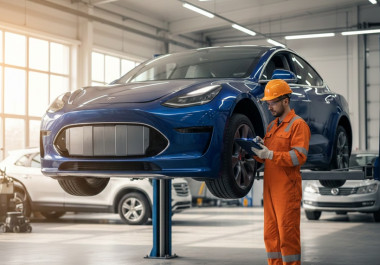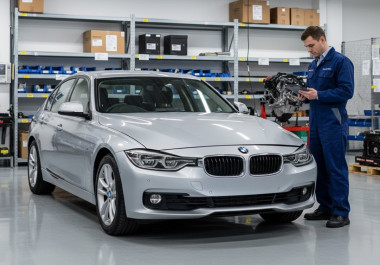The most expensive car at an auction isn't always the one with the highest price tag. More often, it's the 'bargain' that wasn't properly checked. Understanding the difference between a great deal and a costly mistake is what this is all about, and it starts with one question: Are these auctions even legal?
When it comes to car auction legality, the short answer is yes, they are completely legal. But legal doesn’t mean simple. Auctions operate under strict rules designed to keep them fair for everyone. Knowing these rules changes buying at auction from a risky gamble into a smart, calculated move.
So, What Exactly Is a Car Auction?
An auction is a marketplace where vehicles are sold to the highest bidder. The atmosphere can be intense for newcomers, but the principle is straightforward and has been used for centuries. It’s a transparent and efficient way to establish a vehicle’s current market value based on real-time demand.
Auctions happen in two main forms:
-
Physical Auctions: The classic setup where you can inspect vehicles like ex-fleet Ford Transits or three-year-old family saloons in person. You can walk the rows of cars, open the doors, check the engine bay, and get a real feel for the vehicle's condition before the bidding starts. You see the auctioneer, feel the energy of a live crowd, and experience the tension as bids climb. This format is excellent for those who prefer a hands-on inspection.
-
Online Auctions: Where most of the action is now. The growth has been huge because the variety is immense. You can browse, bid on, and buy anything from a seized luxury car and ex-police vehicles to classic MGBs and everyday city cars, all from your desk or sofa. To compensate for the lack of physical inspection, reputable online platforms provide high-resolution photos from every angle, detailed condition reports noting specific faults, and sometimes even video footage of the engine running.
In any format, when the timer ends or the hammer falls, the highest bidder is now legally committed to buying the vehicle. So, what rules keep this fast-paced process fair?
The Rules of the Game: Laws That Protect You
The entire system is governed by a set of UK auction regulations designed to protect everyone. These laws aren't just red tape; they are your protection as a consumer. Understanding them gives you power.
The Sale of Goods Act 1979: The "As Described" Rule
This law dictates that the car must match its description. The description creates a contract, and the vehicle must conform to it. For example, if a listing says 'full service history' and 'two keys,' but the car arrives with a half-stamped book and only one key, it has not been supplied as described. This is also why, as a seller, honesty isn't just a virtue; it's a legal necessity.
Context is everything when it comes to the Act's clause on "satisfactory quality." A 10-year-old car with 120,000 miles isn't expected to be flawless; a few scrapes and a worn interior are part of its character and price. However, if a three-year-old vehicle described as 'minor wear' has its gearbox fail a week later, you have a strong case that it wasn't of satisfactory quality for its age and price.
Consumer Protection from Unfair Trading Regulations 2008: The Honesty Charter
This regulation prevents misleading practices. It makes it illegal for sellers or auction houses to be deliberately deceptive. It’s a powerful tool against bad actors and covers things like:
-
Using "bait-and-switch" tactics: Advertising a pristine VW Golf that isn't actually for sale just to draw people in.
-
Hiding major issues: Not declaring a vehicle a Category S (Structurally Damaged) write-off. This information is critical, as such a vehicle can have its value slashed by 30-40% and may be difficult to insure.
-
"Shill bidding": Using fake bidders or the seller's friends to artificially drive up the price beyond what genuine buyers are willing to pay. This is fraudulent and illegal.
This is why trustworthy platforms are so meticulous in their listings. Adhering to these UK auction regulations is a legal duty that ensures transparency.
The Road Traffic Act 1988: The Safety Standard
A car sold for use on the road must be roadworthy. It needs a valid MOT (if over three years old), tyres with at least the legal minimum of 1.6mm of tread across the central three-quarters, and working brakes and lights. Selling an unroadworthy car without explicitly stating it is a serious offence.
This is critical for salvage vehicles. Many are sold strictly for parts or repair and are not safe to drive. The listing must state this clearly, often with a disclaimer like 'for salvage purposes only.' Driving an unroadworthy car from an auction is illegal and will void your insurance instantly.
Your Pre-Auction Battle Plan
Understanding the general car auction legality is one thing; protecting yourself is another. Preparation is everything, and going into an auction without doing your homework is the quickest way to regret your purchase. A classic mistake is buying a car based on looks without checking its history, only to find it has a £5,000 finance agreement attached that you are now responsible for.
Don't let that be you. Stick to this checklist:
-
Inspect the Vehicle: In person, check for mismatched paint between panels—a sign of accident repair. Look for oil drips under the engine and check for damp smells or water stains inside the cabin. Online, scrutinise every photo, zooming in on panel gaps and interior wear.
-
Read the Description Twice: Understand what terms like ‘sold as seen,’ ‘no warranty,’ or ‘Category S’ mean. These aren’t just casual phrases; they are legally binding and often mean you accept the car with all its current faults, seen or unseen. If you don't understand a term, ask the auction house for clarification before you bid.
-
Get a History Check: This is non-negotiable. For £10-£20, a history check will tell you if the car has been stolen, written off, or has outstanding finance. It can also flag mileage discrepancies by checking against the National Mileage Register, potentially saving you from buying a "clocked" car.
-
Factor in the Fees: The price you bid is not the price you pay. A £5,000 winning bid can easily become £5,600 or more after the buyer's premium (often 10-12%) and admin fees. Remember that VAT is often charged on the premium, and if you're buying a commercial vehicle, VAT will be added to the entire hammer price. Always read the terms, usually found in the help section.
Flipping the Coin: A Seller's Responsibilities
Sellers have legal responsibilities, too. If you're looking to auction your car, honesty isn't just a policy; it's a requirement to avoid future disputes.
-
Be Specific and Honest: Instead of 'minor wear,' state 'a 5cm scratch on the driver's door and scuffing on the front-left alloy.' This level of honesty doesn't just build trust with potential buyers; it also protects you from any claims that the vehicle was misrepresented after the sale.
-
Prove Ownership: You must have the V5C logbook in your name. While the V5C states it is not definitive proof of ownership, it is the primary document required. If the car had financing, you need a settlement letter from the lender confirming it's all paid off.
-
Gather Your Paperwork: A complete service book with stamps, the V5C, the current MOT, and receipts for major work like a cambelt change all build buyer confidence. This paper trail shows a history of care and can directly translate to higher bids.
The Bottom Line: Bid Smart, Not Just High
Car auctions offer value and choice you won't find elsewhere, all built on a system of UK law that ensures fairness. Remember, every car at an auction has a story. Your job isn't just to bid on the car; it's to understand its story first. Do that, and you'll always walk away a winner whether you bought the car or not.
Your best tools are your eyes, your brain, and a bit of healthy scepticism. Do the research, know the terms, and set your budget before you start. When you're ready, you can browse all current vehicle auctions knowing you've got the inside track.




